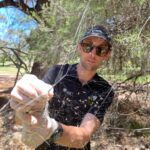C166/10
Curtin University research has established that female marine snails living off the Perth coast are growing male sex organs after exposure to the chemical TBT.
A high percentage of the snails are suffering from imposex, a condition which involves the development of a second sex organ after being exposed to the chemical. Unlike the common garden snail that is a hermaphrodite and exhibits both sexes in the one individual, this particular species of marine snail has distinct sexes.
In this case, the female snails have been documented growing penises on their foreheads.
Associate Professor Monique Gagnon, Deputy Head of Curtin’s Department of Environment and Agriculture, said studies on the marine snail Thais orbita over the past decade indicated that although contamination from TBT appeared to have declined steadily at sites visited by recreational boats, high rates of imposex still existed at sites where large commercial vessels are present.
“The occurrence of imposex amongst female Thais orbita at sites in and around commercial harbours is still 100 per cent,” Associate Professor Gagnon said.
“These high levels are believed to be related to the continuous input of TBT into the area over a period of years, resulting in the presence of significant quantities in the sediment on the sea floor.”
Associate Professor Gagnon said Fremantle port and the Garden Island naval facility are the main known sites where TBT contamination is present in the Perth region.
High levels of imposex have also been recorded 20km north of Fremantle; possibly caused by northerly currents that have transported the chemical, or by recreational vessels and commercial shipping traffic off the coast.
Imposex usually impairs reproduction in most species that it affects. Associate Professor Gagnon said this was certainly the case with Thais orbita.
“Studies have shown that imposex might stop the affected females from procreating, potentially reducing the number of snails in the shoreline environment. Because Thais orbita is a predatory snail, a reduced population of these animals can translate into an altered biodiversity in the rocky shorelines.
“Although the half-life of TBT can be as short as six hours in water, if present in the sediment it remains for several years and has the potential to impact on marine organisms.”
Associate Professor Gagnon said all sites showed some instance of contamination; from 100 per cent around the commercial harbours in Fremantle, 82 per cent at South Jervoise Bay, Munster, and down to five per cent at Armstrong Point on Rottnest Island.
“The presence of TBT in sediments located around dry docks, hull cleaning facilities, commercial docks and harbours has in the past resulted in high levels of imposex, and this still remains the case due to TBT’s relative longevity in sediments,” she said.
TBT has been used as an anti-fouling biocide in paint for underwater surfaces since the 1960s. These biocides were used to prevent the growth and attachments of organisms that can inhibit vessel speed and efficiency.
“Anti-fouling paints are clearly required for marine vessels, oil rigs and many other commercial marine structures,” Associate Professor Gagnon said.
Since the ban of TBT by the International Maritime Organisation in 2008, many alternatives are being used.
“TBT’s ability to persist in sediment suggests that the legacy of environmental degradation left by its use may continue to affect marine ecosystems around Perth into the future.”
The samples of Thais orbita were collected along the Perth coastline between March and June 2009.
Attention Editor/COS: Photographs are available upon request.
Contacts:
Associate Professor Monique Gagnon, Department of Environment and Agriculture; Curtin
Tel +61 8 9266 3723; Mobile 0401 103 312; Email m.gagnon@curtin.edu.au
Teresa Belcher, Public Relations, Curtin
Tel: 08 9266 9085, Mobile: 0401 103 755, Email: teresa.belcher@curtin.edu.au


